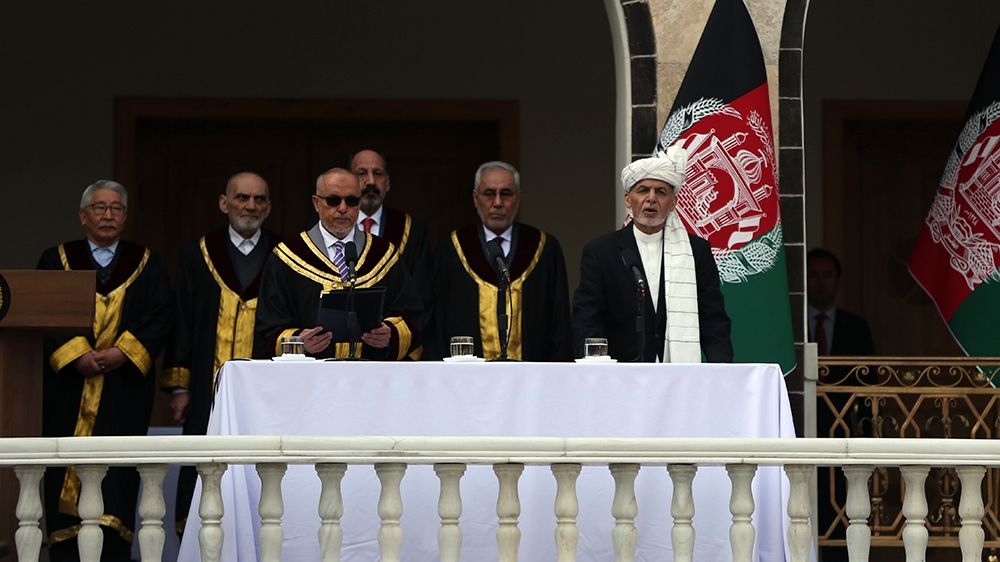Ghani sworn in as Afghan president, rival holds own inauguration
President-elect Ashraf Ghani and his rival Abdullah Abdullah take separate oaths as US mediation efforts fail.

Afghan President Ashraf Ghani has taken an oath for a second term but his main rival Abdullah Abdullah has refused to recognise the inauguration, holding his own swearing-in ceremony, landing the country in a new political crisis.
Afghan local news channel TOLOnews reported international representatives, including US special envoy Zalmay Khalilzad, and US and NATO forces commander General Scott Miller, attended Ghani’s inauguration at the Presidential palace in the capital, Kabul.
Keep reading
list of 3 itemsUS defence chief in Afghanistan to help revive stalled talks
Afghan preliminary vote results delayed due to ‘technical issues’
Abdullah Abdullah rejected the presidential election results announced last month, saying Ghani’s win was invalid because of vote-rigging in a repeat of the 2014 elections marred by fraud.
He held his own ceremony coinciding with Ghani’s, suggesting talks between the two camps and Khalilzad, the US envoy aimed at brokering an agreement had not been successful.

Earlier on Monday, Abdullah agreed to suspend his swearing-in event on the condition that Ghani follow suit. But Ghani, who was declared the winner of September’s election, decided to go ahead with his inauguration.
The two men issued invitations last week to parallel swearing-in ceremonies on Monday, after Abdullah disputed the February 18 decision by the electoral commission and proclaimed himself the winner.
‘International community sides with Ghani’
“It seems the international community has sided with Ghani, legitimising his position as the president,” Faiz Muhammad Zaland, a political analyst based in Kabul, told Al Jazeera.
Zaland however, said that “on the domestic level, Abdullah seems more legitimate as all strong political figures and parties are backing him”.
“Today is the start of a political decision in Kabul which will require both international and domestic approvals to go forward for the intra-Afghan negotiation to happen,” he said.
Meanwhile, Taliban spokesman Suhail Shaheen told Al Jazeera that the political standoff between the top leaders is “not a good sign for prospects of peace in the country”.
Analysts say the latest political crisis is likely to delay the anticipated intra-Afghan talks scheduled for Tuesday as part of Afghanistan’s nascent peace process.
“Not only will this almost certainly delay the intra-Afghan talks, but complications are very likely to follow from this political standoff, when it comes to composing the pro-government negotiating team – and its positions on critical issues,” Andrew Watkins, a senior analyst on Afghanistan at the International Crisis Group, told Al Jazeera.
“However, many of the difficulties that lie ahead in the peace process would have remained, even had Khalilzad’s mediation efforts succeeded in resolving this political theatre.
“The divide between Ghani and many opposition figures would have remained substantive even under some form of compromise, which would have prompted many of the same hurdles in the peace process that Afghanistan now faces,” Watkins said.
The political infighting in Kabul does not bode well for Afghanistan’s fragile democracy as US troops prepare to leave the country following an agreement with the Taliban armed group, with President Donald Trump committed to ending the US’s longest war.
US Special Envoy Zalmay Khalilzad reportedly held meetings with Ghani and Abdullah until late Sunday to convince them to postpone the inauguration.
The crisis comes as the government is meant to be preparing for talks with the Taliban, to follow up on the February 29 pact between the US and the Taliban on the US troop withdrawal after 18 years of war.
Ghani and Abdullah held roles in the previous government under a US-brokered power-sharing agreement that followed the 2014 elections.
A former foreign minister, Abdullah held the specially created post of chief executive in the outgoing government.
Under election law, the swearing-in ceremony for president must be held within 30 days of announcing the winner.